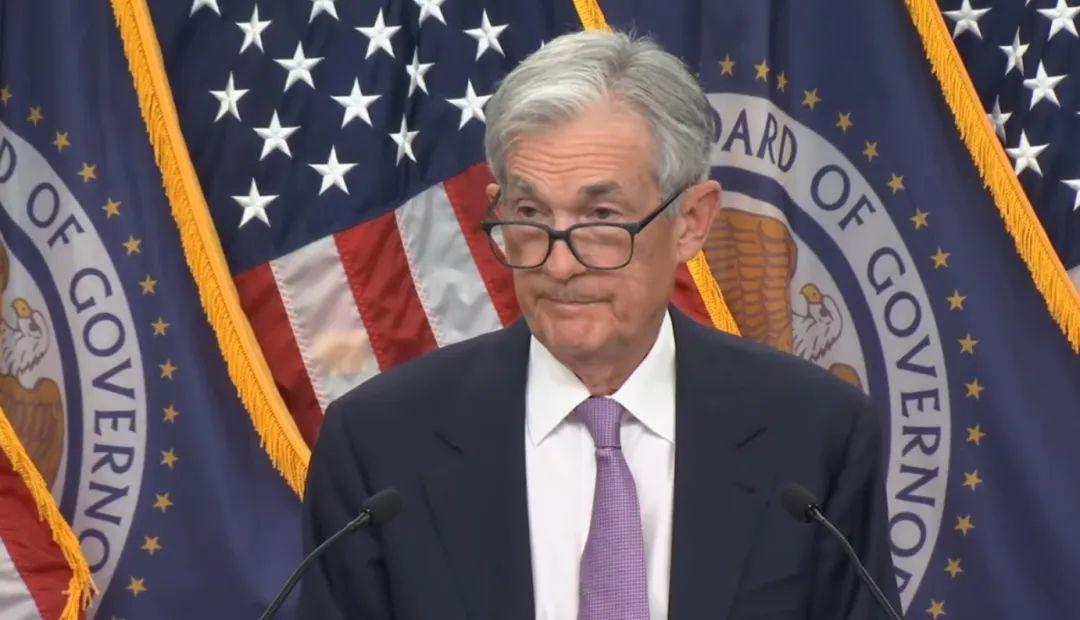Written by: Lorenzo Tondo, Chris Michael
Translated by: Shan Oppa, Golden Finance
This election is referred to as the most critical in American history, and it is undoubtedly one of the most tumultuous elections as well. The incumbent president announced his withdrawal from the race near the end of the campaign, one of the candidates was convicted of a crime, and several assassination attempts occurred. We review some key moments in this political struggle, which is tied to the survival of American democracy, against the backdrop of two global conflicts.
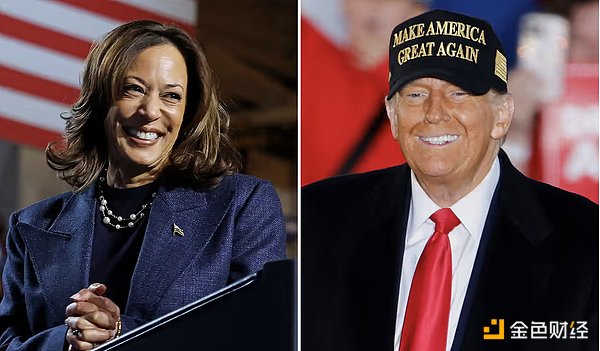
1. The Challenger
Florida's far-right Governor Ron DeSantis is widely regarded as the most likely Republican candidate to prevent former President Donald Trump from becoming the party's nominee for a third consecutive term. However, despite the support of media mogul Rupert Murdoch, DeSantis announced the end of his failed campaign in January and ultimately endorsed Trump. Trump's team had previously mocked DeSantis as "Pudding Fingers" due to his eating habits. DeSantis almost participated in the race as a current candidate, but his final strong opponent was former South Carolina Governor Nikki Haley, who unexpectedly became the representative of the anti-Trump vote. Questioning Trump's mental health and loyalty to the U.S. Constitution, the former U.N. ambassador garnered significant support and persisted until Super Tuesday in March, ultimately announcing her withdrawal, leaving Trump as the last major candidate for the 2024 Republican nomination.
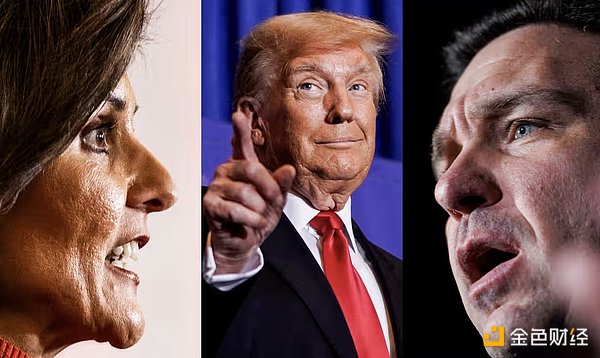
Nikki Haley (left) and Ron DeSantis (right) failed to stop Trump from becoming the Republican candidate for a third time. Image source: Bloomberg, Getty Images, Reuters, U.S. EPA
2. The President
In American political history, incumbent presidents seeking re-election typically enjoy a significant advantage in campaigns. However, Joe Biden—the oldest president in U.S. history—went against the trend, as his remarks were often confusing, he frequently misspoke, and at times he seemed incoherent during speeches, raising concerns about his age and ability to face Trump again. Nevertheless, with almost no opponents, the 46-year-old president swept the Democratic primaries, becoming the party's candidate for 2024, and vowed that despite his age, he remained the most capable candidate to defeat Trump.
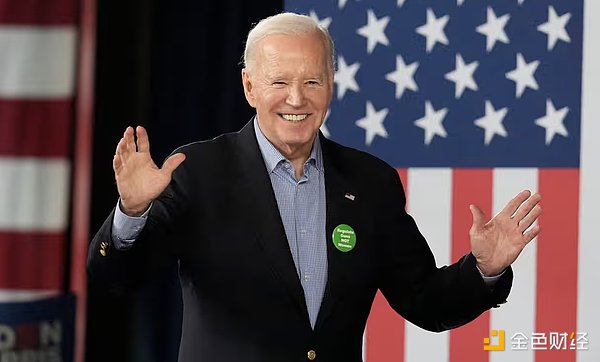
Joe Biden waves to supporters after speaking at a campaign event in March. Image source: Brynn Anderson/AP
3. The Trial
The first real shock of the election campaign occurred on May 30, when a jury of 12 in New York City found Trump to be the first former president in U.S. history to be convicted. The jury found him guilty of 34 counts of falsifying business records to cover up a $130,000 hush money payment to adult film star Stormy Daniels, aimed at concealing a scandal before the 2016 election. Trump's legal troubles extend far beyond this: he faces over 90 criminal charges, including racketeering charges in Georgia, where he is accused of conspiring to overturn the 2020 election results. This case also marked a milestone: the first mugshot of a U.S. president. (The case later took a dramatic turn when prosecutor Fani Willis was found to be involved with one of the prosecutors she hired, leading to a suspension of the case while awaiting a judge's decision on whether to disqualify her.) Additionally, in February, a federal judge ruled that Trump must pay $83.3 million in damages to writer E. Jean Carroll, who filed a defamation lawsuit after Trump publicly denied the sexual assault allegations, with the judge deeming the allegations "substantially true." Many other cases remain stalled, as Trump continues to employ his usual legal strategy: delay, delay, and delay.
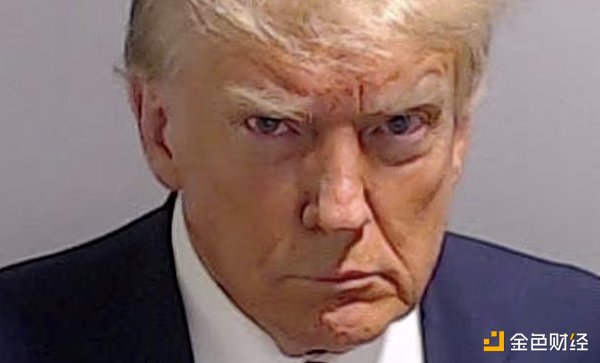
The Fulton County Sheriff's Office released a facial photo of Donald Trump. Image source: Fulton County Sheriff's Office / Reuters
4. The Debate
Biden's performance in the first presidential debate held in Atlanta, Georgia, on June 27, was perhaps the worst in American history. He was hoarse, stammered, stumbled several times, paused awkwardly, and even mumbled at times, ultimately claiming, "We finally defeated Medicare." Panic ensued among Democratic leaders and donors, who blamed Biden's campaign team and the media for failing to adequately consider his significantly declining mental state. At 81, calls for Biden to step aside grew louder, and Democratic strategists began to question whether a younger candidate should be brought in to face Trump.
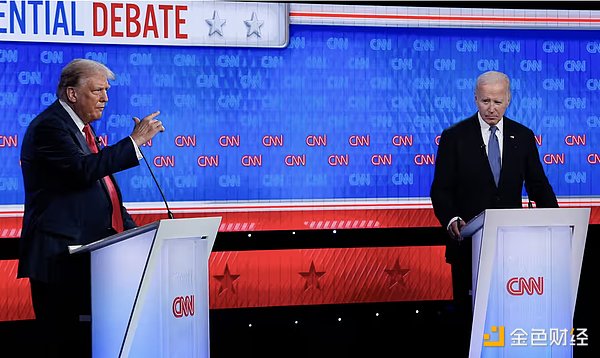
Trump and Biden during the first presidential debate in June, with the president's poor performance shocking Democrats. Photo: Gerald Herbert/AP
5. The Immunity Ruling
On July 1, the U.S. Supreme Court made a shocking ruling: Trump enjoys at least partial immunity from criminal prosecution for actions taken while in office. This ruling was a significant victory for Trump, effectively destroying the possibility of a criminal trial related to his attempts to overturn the 2020 election results, at least until after the new election in November 2024. This ruling also served as the latest proof of the right-wing's control over the Supreme Court, a situation facilitated by Trump appointing three extremely conservative justices. The conservative justices not only overturned Roe v. Wade—a great victory for the anti-abortion movement, which Trump took pride in—but they also sparked greater controversy in May when a photo showed an upside-down American flag supporting Trump's "Stop the Steal" movement flying in front of Justice Samuel Alito's home. Following the immunity ruling, special prosecutor Jack Smith filed new, more concise charges against Trump. Trump responded by stating that if he were re-elected, he would fire Smith "in two seconds."
6. The Shooting Incident
On July 13, at a campaign rally in Butler, Pennsylvania, Trump was shot in the right ear by 20-year-old Thomas Matthew Crooks, who fired from the rooftop of a nearby building with an AR-15-style rifle. Crooks fired eight shots at Trump, who stood protected by security personnel, raising his fist and shouting, "Fight, fight, fight!" This moment became an iconic photo. The shooting resulted in one participant's death and two others seriously injured; Crooks was shot dead by security personnel. Just nine weeks later, on September 15, Trump became a target of assassination again, this time at his golf club in West Palm Beach, Florida, where the Secret Service discovered 58-year-old Ryan Wesley Roos hiding in the bushes with a rifle. These incidents not only triggered a crisis for the Secret Service but also provided a strong rallying cry for Trump's re-election: he appeared at the Republican National Convention wearing ear protection after the Butler shooting incident, receiving a warm welcome.
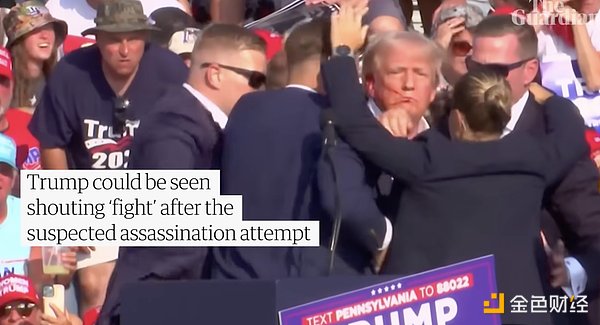
Donald Trump's assassination attempt suspect was shot dead after the incident.
7. The Withdrawal
At 1:46 PM on July 21, Biden announced that he would not seek re-election—ending weeks of intense speculation and immense pressure from lawmakers, donors, activists, and voters, all questioning his ability to defeat Trump again. The intervention of actor and Democratic fundraiser George Clooney played a crucial role: "It's cruel to say, but three weeks ago when I spent time with Biden, he was no longer the 'big deal' Biden of 2010," he wrote. Biden's long-time political ally, former House Speaker Nancy Pelosi, also played a significant role at a critical moment, deciding to limit the president's legacy to a single term, which she referred to as a "calculated decision" aimed at the country's best interests—she later told The Guardian that she had not contacted her old friend Biden since then.
8. The Coronation Ceremony
On August 23, with Biden's full support, Vice President Kamala Harris officially accepted the Democratic presidential nomination on stage in Chicago, becoming the first Black woman to lead a major party. Harris declared that this election was an opportunity for America to "forge a new path forward" and encouraged voters to write "the next great chapter of the most extraordinary story ever told." The impact of this move was immediate: she raised over $1 billion in less than three months, setting a record and attracting enthusiastic crowds to vibrant rallies, where she focused on reproductive rights, economic aid for the middle class, and the preservation of American democracy.
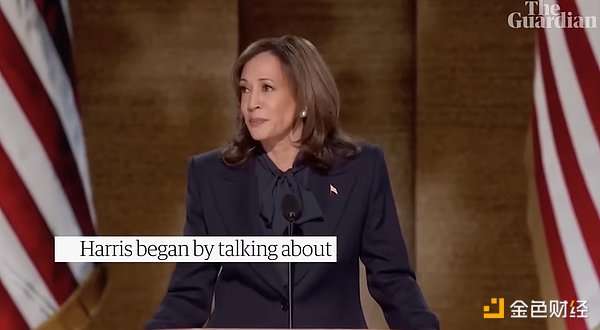
Kamala Harris accepts the Democratic nomination, calling on Americans to "fight for this country."
9. The Dark Horse
Robert F. Kennedy Jr., a scion of America's most famous Democratic family, who once garnered as much as 10% support in national polls, announced his withdrawal from the independent presidential race. Kennedy faced a series of scandals, including allegations of assault against a former nanny. He also admitted to having dumped a bear carcass in Central Park a decade ago, a case that had puzzled New Yorkers. After exiting the race, the environmental activist turned into a vaccine skeptic and wavered between the two parties—reportedly having contacted Harris in August to discuss supporting her, contingent on receiving a job, before ultimately choosing to back Trump, who allegedly promised him control over health agencies. Other third-party candidates still in the race include environmentalist Jill Stein (who ran for president as a Green Party candidate in 2012 and 2016), progressive activist Cornel West, and Libertarian candidate Chas Oliver.
10. Vice Presidential Candidates
In July, Ohio Senator J.D. Vance officially accepted Trump's nomination as his vice presidential candidate—this marked a dramatic shift for Vance, the bestselling memoirist of "Hillbilly Elegy," who had previously identified as an "anti-Trumper" and referred to his new boss as "America's Hitler." However, if there is one phrase that will ensure J.D. Vance is remembered in history, it is his controversial definition of Democratic leaders: "a bunch of childless cat ladies," which he stated in 2021 to Fox News host Tucker Carlson. On the other hand, Harris chose Minnesota Governor Tim Walz, a former teacher and high school football coach from rural Nebraska who served 24 years in the National Guard before entering politics. Walz gained national attention for effectively criticizing the Republicans: "These people are really strange."
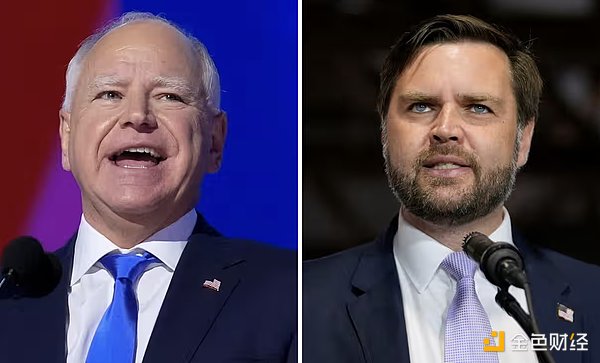
Vice presidential candidates: Tim Walz (left) and JD Vance. Image source: AP
11. The Billionaire
The world's richest man officially announced what most suspected after his acquisition of Twitter and its rebranding to the more extreme X: he is an unabashed cheerleader for Trump. First supporting Trump after the assassination attempt, then dancing at a Trump rally, the owner of Tesla, SpaceX, and several other companies threw himself into his latest role with a fervor that left even the most active political billionaires blushing. Musk became a policy advisor to Trump, a major donor, and (through his American Pacific Alliance campaign team) a leading figure in the Republican "ground game," aimed at getting voters to the polls. In October, he also began giving away $1 million daily to registered voters in Pennsylvania—leading a judge to require him to appear in court on charges of running an "illegal lottery." For those questioning what Musk stands to gain, observers pointed out that he has secured billions in federal contracts, with Trump promising to involve him in weakening regulatory agencies.
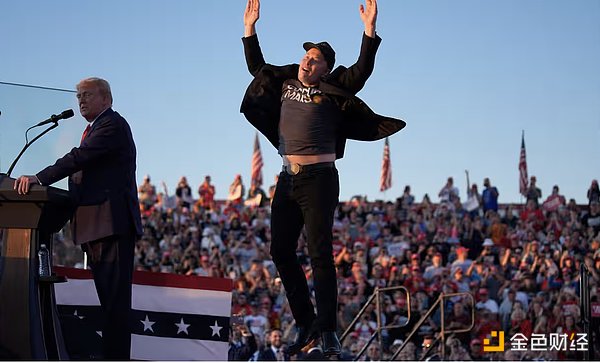
Musk jumps on stage at a Trump rally in Butler, Pennsylvania. Image source: Evan Vucci/AP
12. Debate 2.0
On September 11, Harris outperformed Trump in their first debate, seemingly validating Biden's graceful exit decision and marking a significant change in her fortunes, as she slightly led Trump in the polls—though the polls remained largely even for the rest of the campaign. However, the most eye-catching moment of the debate was not Harris's victory but Trump's remarks about Haitian immigrants: "In Springfield, they're eating dogs," Trump said. "They're eating cats. They're eating the pets of the people who live there." This statement quickly became immortalized by a popular song. It was an obvious lie but was soon debunked. Initially, it seemed to hurt the Republicans, but Trump and Vance not only did not deny it but began to repeat it as part of their anti-immigration focus, which became a driving principle of their campaign, including a promise to carry out the largest deportation in U.S. history.
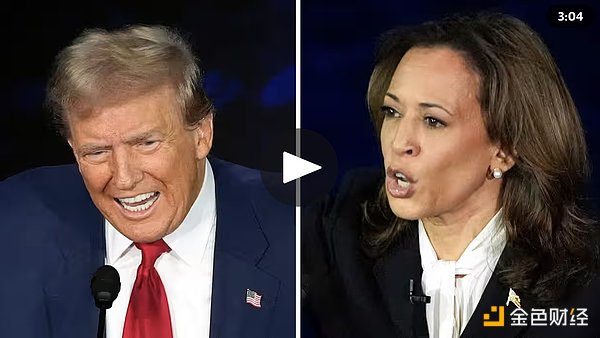
Harris and Trump: Highlights from the presidential debate
13. Celebrities
If Trump could rely on the support of this global billionaire, Harris could count on the backing of the highest-selling artists. Minutes after the debate ended, Taylor Swift posted on Instagram supporting Harris, encouraging fans to register to vote, signing off as "Ms. Cat Lady," a jab at Vance's slur. She was not alone: Charli XCX had already sparked a series of memes supporting Harris on Twitter, posting that "Kamala is a baddie"—a lifestyle inspired by the lavish rave culture of the early 21st century and the title of her hit album "Baddie." Ultimately, Beyoncé, Eminem (who rapped his hit "Lose Yourself" at a rally for Barack Obama in Detroit, telling his hometown to "speak up" for Harris), and dozens of other pop stars supported Harris. From actors like Robert De Niro (who clashed with Trump supporters outside the former president's hush money trial in New York) to the cast of Marvel's "Avengers" films, to athletes like LeBron James ("When I think about my kids and my family and how they will grow up, my choice is clear"), most of the most prominent celebrity endorsements went to Harris—though Trump could boast of having Hulk Hogan, Dr. Phil, and Kid Rock in his camp.
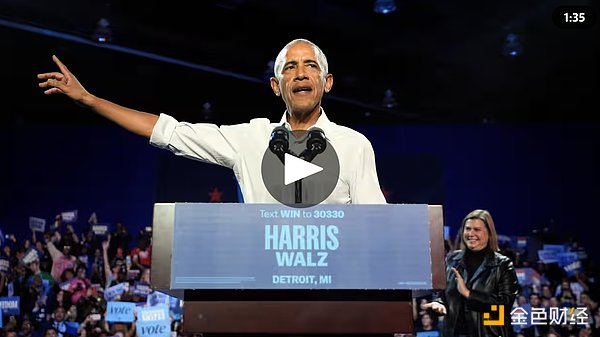
Obama raps at a Harris campaign rally
14. The Rally
When Trump and his followers held a rally at Madison Square Garden in New York, anger and vitriol took center stage, with Trump making racist remarks, crude insults, and threats against immigrants. Nearly 30 speakers took the stage, some delivering a series of racist comments targeting Latino, Black, and Jewish citizens. Tony Hinchcliffe said, "I don't know if you guys know this, but there is really a floating garbage island in the middle of the ocean. I think it's called Puerto Rico." He made other controversial remarks, including naming a Black person while discussing watermelons. In the following hours, Democrats, celebrities, and bipartisan Hispanic groups condemned these remarks as "offensive" and "derogatory," with many Puerto Rican voters indicating they would switch their support to Harris—who could be a key voting bloc in the swing state of Pennsylvania. The event has been compared to the infamous Nazi rally held at the venue in 1939, with the Democratic National Committee projecting images outside the building, repeating the former chief of staff's claim that Trump "praised Hitler"—though Vance denied the comparison, many noted that until 2016, Vance himself had hinted that Trump could become "America's Hitler."
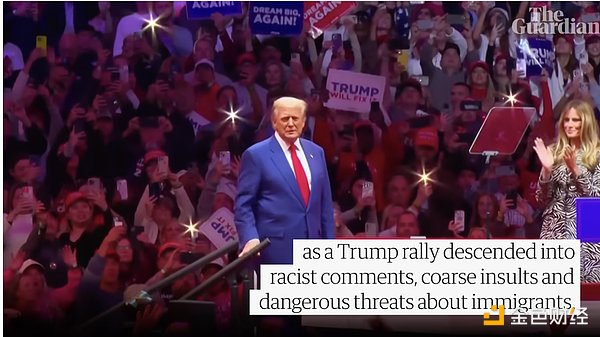
Donald Trump filled Madison Square Garden with anger, vitriol, and racist threats
15. The Final Pitch
The days leading up to the election are always the craziest, and the 2024 campaign was no exception, with candidates hurling insults at each other and billions around the globe watching the latest polls, which showed neither Trump nor Harris with a clear lead. The White House was brightly lit as Harris attracted over 75,000 people in Washington, D.C., who called Trump "another little tyrant," standing in the same spot where he had incited a mob to storm the U.S. Capitol nearly four years earlier to retain power. Meanwhile, Trump continued to smear immigrants and rode in a garbage truck to a rally, a stunt aimed at attacking the Democrats. Police chiefs and sheriffs across the country prepared for potential violence against election workers, chaos at polling stations, and harassment of voters, while unfounded claims of voter fraud raised concerns that if Trump lost the election, he might again refuse to accept the results—and this time, millions of Americans might do the same.
免责声明:本文章仅代表作者个人观点,不代表本平台的立场和观点。本文章仅供信息分享,不构成对任何人的任何投资建议。用户与作者之间的任何争议,与本平台无关。如网页中刊载的文章或图片涉及侵权,请提供相关的权利证明和身份证明发送邮件到support@aicoin.com,本平台相关工作人员将会进行核查。
